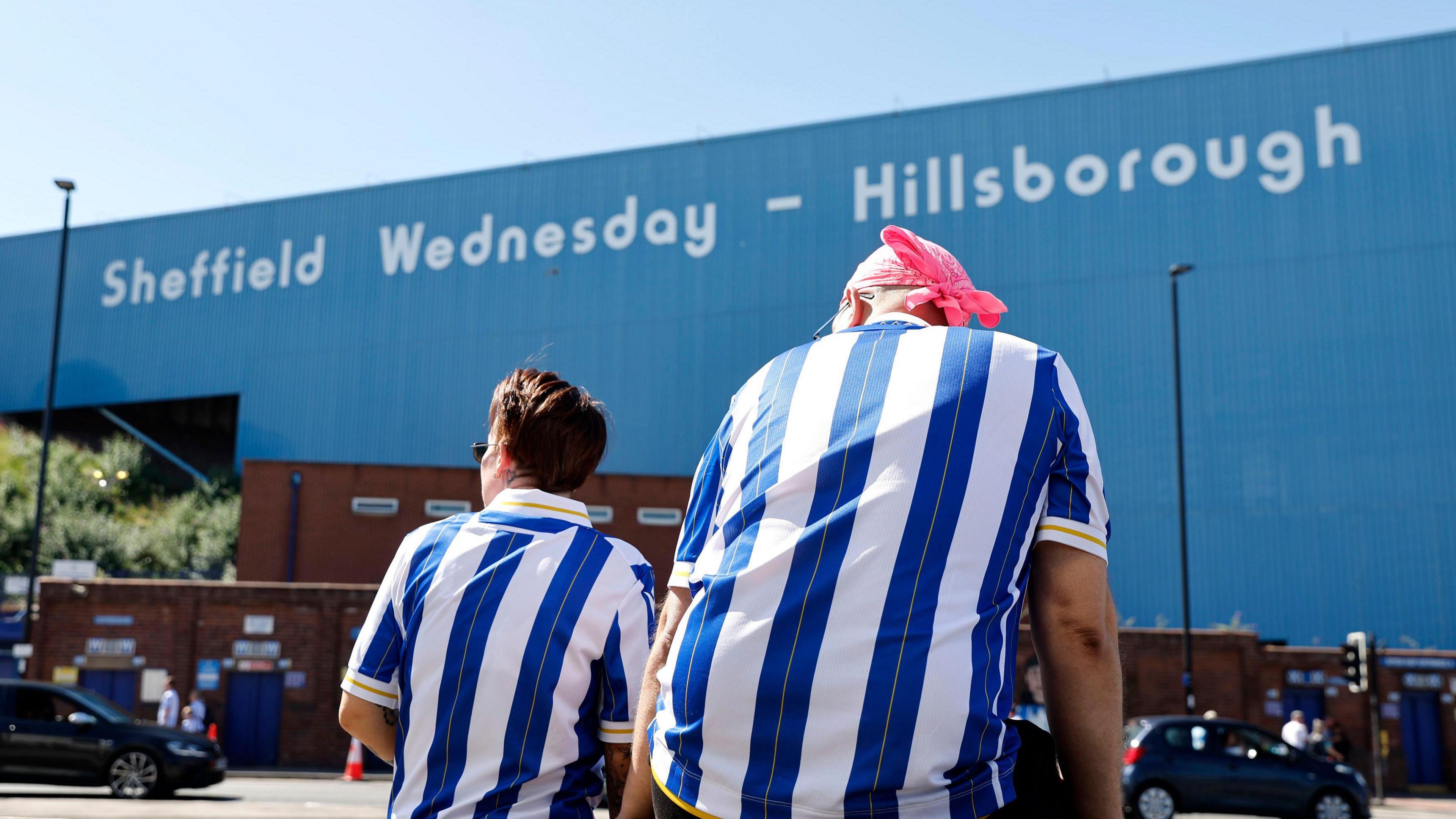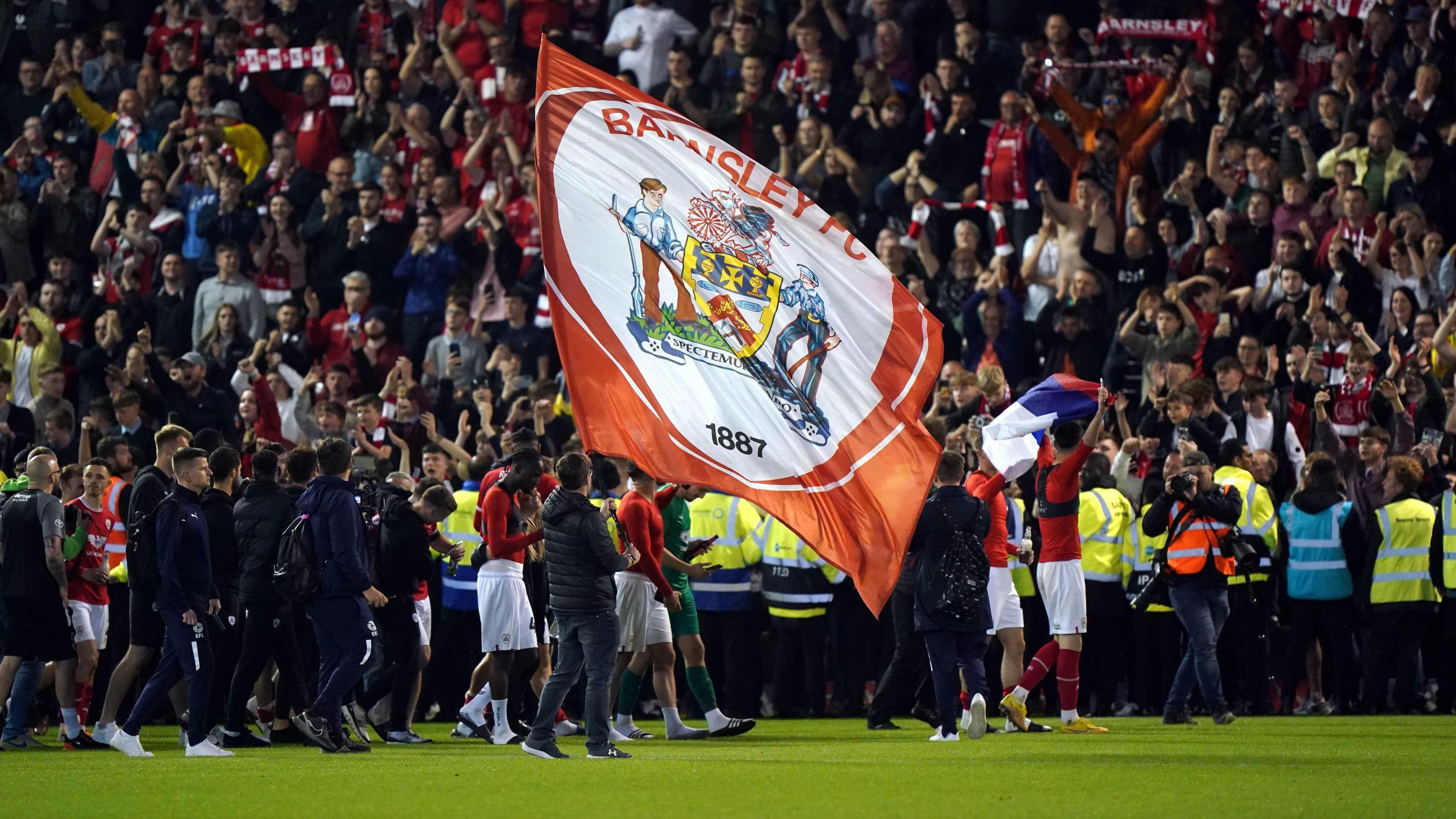Football fans fear impact of new kick-off times

Sky Sports and the EFL have struck a new deal which will affect kick-off times for some matches
- Published
Changes to match kick-off times for English Football League (EFL) clubs could hit attendances and revenue for local businesses, fans in South Yorkshire have warned.
Under a new deal between the EFL and Sky, some new season fixtures have moved to weekdays, with others moved to earlier on Saturdays so they can be televised.
Sky and the EFL said five months’ notice had been given for matches chosen for broadcast, and most of the 36 matches across three divisions on a regular Saturday would not be moved from their usual 15:00 kick-off slot.
But fans in South Yorkshire said the changes could make it more difficult for them to attend away matches and might affect families wanting to watch the games.
Sky Sports and the EFL said the five months’ notice of changes to kick-off times was a significant improvement on the previous position, which saw only five weeks' notice given across the majority of the season.
'Later finish'
Paul Mayfield, a branch secretary of Doncaster Rovers Supporters Club, said there was now an oversaturation of football on TV, with the EFL and clubs prioritising broadcasters.
“Tomorrow, we’ve got 500 fans going down to Newport, but I would have expected more," he said.
"I had eight people cancel on the bus last night because they said it was cheaper to watch it on the telly than the £30 on the bus and the £20 ticket for the game."
Mr Mayfield added: “If they swap it to midweek nights, we haven’t got the infrastructure in this country for trains to come back.”
Meanwhile, Barnsley fan Daniel Finney said while the increased notice given by Sky and the EFL was an improvement, the changes would still affect fans.
Mr Finney said he was concerned later midweek starts would particularly have an impact on younger fans.
“It affects people in different ways. I’ve got two young nephews. One’s seven, one’s got his first season ticket and he’s three," he explained.
"What Sky isn’t bearing in mind is that when you do have younger supporters, if it’s a midweek game, it does tend to be a lot later finish - and they're the sort of fans we’re wanting to recruit, going forward.”

Barnsley FC fan Daniel Finney said the change would impact younger fans of the club
Garry Fisher, who runs the Old Crown Inn opposite Sheffield Wednesday's Hillsborough Stadium, said he feared the changes could see him lose a lot of his usual profit on match days.
“If it’s changed from a Saturday to a midweek, you can halve your takings straight away because people are not coming in and drinking beforehand.
“I could take £5,000 or £6,000 on a Saturday, instead of £2,500 or £3,500 if it’s a midweek.”
However, Dr Dan Plumley, a sports finance expert at Sheffield Hallam University, said the deal between Sky and the EFL over match times was a good one for clubs.
“The broadcasters will pay the EFL a lump sum of money for the contract. The lump sum for the deal is £935m over five years," he said.
"That’s a 50% increase on the previous deal and what the EFL do with that money is then distribute that to the club network in a revenue payment.
“The financial reality is that the club will earn more from this deal than the previous deal and that’s why a majority of 72 clubs will agree to this deal."
Dr Plumley said that it was "better for the clubs in revenue terms, but what we’ve not seen yet is the breakdown of how the EFL will distribute this to each club".
On the pitch, he added, there were "winners and losers and there’s always a trade-off".
"I can understand some of the businesses' frustrations that it’s going to hurt their trading around the match day, but football is more of a business than ever before. The pros have outweighed the cons for clubs," Dr Plumley said.
Listen to highlights from South Yorkshire on BBC Sounds, catch up with the latest episode of Look North or tell us a story you think we should be covering here, external.